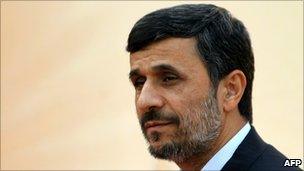Why some Iran conservatives are turning against Ahmadinejad
- Published

Conservatives accuse Mr Ahmadinejad of breaking the law
Iranian MPs are reportedly trying to raise a petition that would allow them to debate the impeachment of President Mahmoud Ahmadinejad.
Mr Ahmadinejad has two well-known sets of opponents - Western governments trying to prevent him from obtaining nuclear weapons; and the Iranian reformist movement which tried to defeat him in the 2009 presidential election.
But now, a third set of opponents has begun to emerge - from within the ruling conservative movement.
This collection of opponents may prove to be more dangerous to Mr Ahmadinejad than the first two.
On Sunday, an article in the Wall Street Journal, external said four lawmakers had released a report accusing the president and his government of breaking the law.
The alleged offences include a $590m withdrawal from the Central Bank's foreign reserve fund without parliamentary approval; the illegal import of oil and natural gas; and lack of transparency in budget spending.
Ray Takeyh, an Iran watcher at the New-York based Council on Foreign Relations, says conservatives are concerned that the president is trying to transform the country "from the Islamic Republic to the Ahmadinejad Republic".
Conservative newspapers in Iran also report that lawmakers have started a petition to collect 74 signatures to debate impeachment in parliament.
Conservatives fractured
In practice, impeachment cannot go ahead without the approval of Supreme Leader Ayatollah Ali Khamenei.
It's been reported that Mr Khamenei has ordered the parliamentarians not to go ahead with their move.
Ali Ansari from St Andrews University in the UK says Ayatollah Khamenei has decided to "wed himself" to the fortunes of his president
According to Mansour Farhang of Bennington College in the US, impeachment "only has a chance if Ayatollah Khamenei is 100% behind it".
But, he adds, Mr Khamenei has too much of his credibility invested in Mr Ahmadinejad for this to happen.
Still, the move against President Ahmadinejad shows that the conservative movement - which came together temporarily in 2009 to see off the threat posed by the opposition Green movement - has fractured.
President Ahmadinejad represents the ultra-conservatives - a populist movement led by pious, austere veterans of the Iran-Iraq War.
But his faction is increasingly opposed by other conservatives - who object to a concentration of power under the presidency.
Mahmoud Ahmadinejad may have the support of the Supreme Leader for now. But in the long-term, some believe that his position may come under threat.
"Increasingly I'm beginning to think that his (Ahmadinejad's) removal is possible," says Ray Takeyh.
"The charges against him are that he is attempting to centralise power in his hands. And that, in due course, will threaten Khamenei if he's not careful."